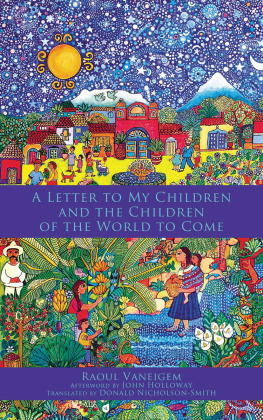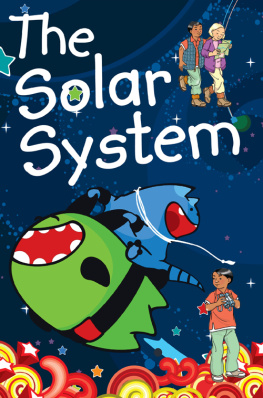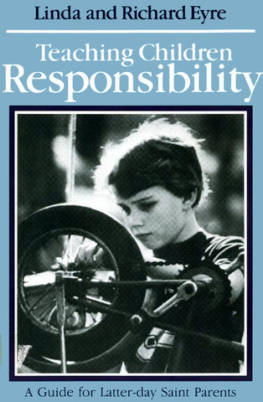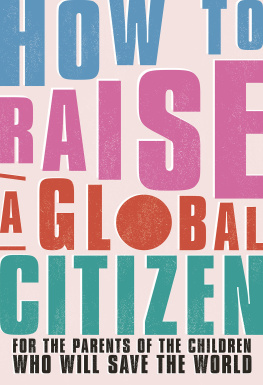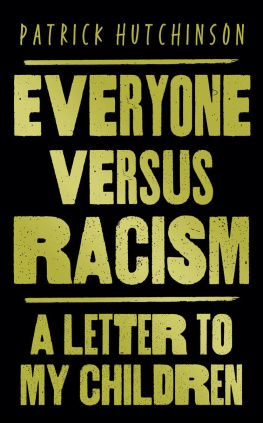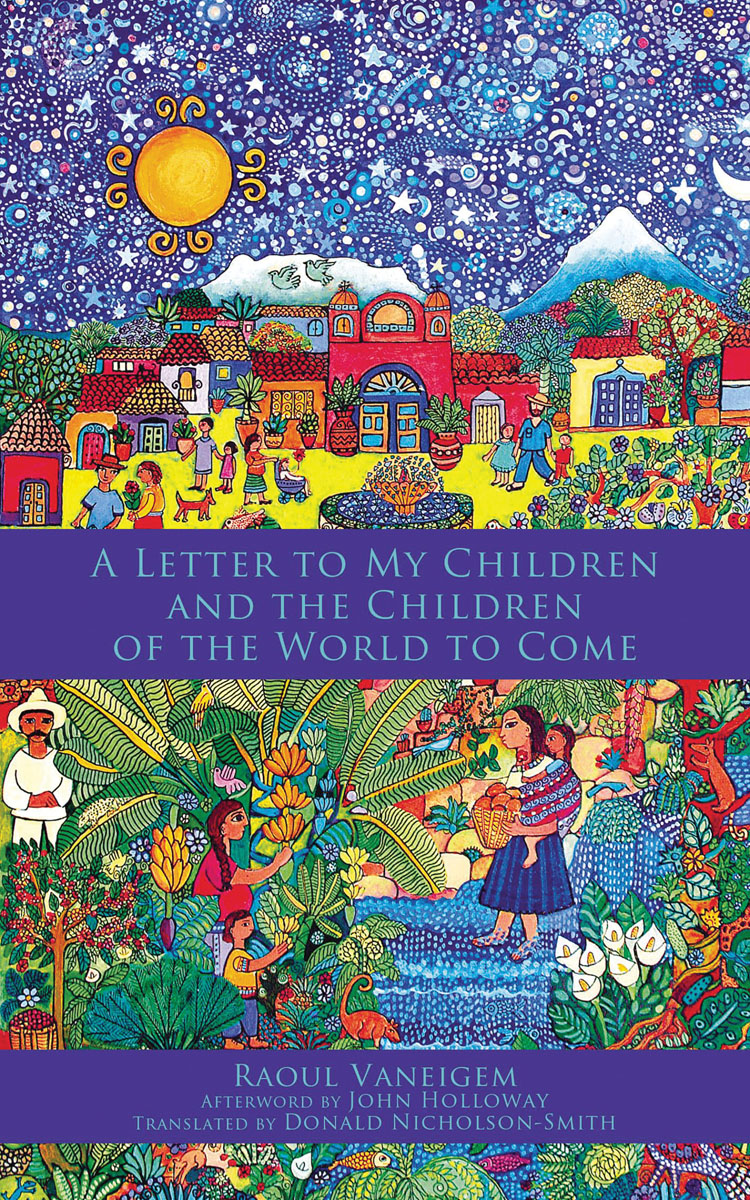
A Letter to My Children and the Children of the World to Come
Raoul Vaneigem
Originally published as Lettre mes enfants et aux enfants du monde venir by Le Cherche Midi 2012
English translation 2019 by Donald Nicholson-Smith
Afterword 2019 by John Holloway
This edition PM Press 2019
All rights reserved. No part of this book may be transmitted by any means without permission in writing from the publisher.
ISBN: 9781629635125
Library of Congress Control Number: 2017964743
Cover by John Yates / www.stealworks.com
Interior design by briandesign
10 9 8 7 6 5 4 3 2 1
PM Press
PO Box 23912
Oakland, CA 94623
www.pmpress.org
Printed in the USA by the Employee Owners of Thomson-Shore in Dexter, Michigan. www.thomsonshore.com
For Ariane, Ariel, Chiara, Tristan, Garance, Renaud, Sasha, Lunta
We need but one thing:
the deep joy of life.
Let its poetic power awaken and reveal itself
and everything else will be given us.
Contents
Preface to the English-Language Edition
The Consciousness of Life May Slumber but It Never Dies
The democratic election that has just installed an individual with alarming mental shortcomings in the presidency of the United States is but one example among others of the slow-motion collapse of the socioeconomic system that prevails everywhere. The sinister scythe of the multinational corporations delivers up the planet to plunder, accelerates immiseration, threatens the very survival of populations, and devastates animal, vegetable and mineral resources, which fall prey to greed and the religion of money.
Why should we be surprised if everyday life and its human consciousness are smothered and stultified by the totalitarian rule of the economy? Or if the dismay and despair so relentlessly nurtured by the international of profit and by the words that serve it end up by creating submissive hordes to whom idiocy and heedless apathy offer a sort of consolation?
The great dictatorships of the past were not blind to this phenomenon and excelled at profiting from it. In the day of a Hitler, a Stalin, a Mao or a Franco, however, the development of capitalism and the social benefits it promised lent a degree of plausibility to the notion of a supreme guide with the authority to sacrifice the present on the bloody altar of happiness to come. Now that capitalism has lost its dynamism and invests the income it hurriedly reaps from its ravages in purely financial speculation, the stagnation into which it has sunk no longer has the slightest chance of providing an apprentice dictator with the strategic opportunities once furnished by state or private capitalism, a portion of whose profits ended up improving working conditions and boosting social gains.
Populism is the product of the bastardization of Nazism and Stalinism. The class consciousness of the proletariat had already been roundly crippled by trade-union and political bureaucracy by the time the great consumerist colonization brought the solvent power of the market of false well-being to bear on the remains of all the intelligence and combativity that the workers movement had developed and honed in its struggles before capitalism abandoned the realm of production for the now far more profitable realm of consumption.
The proletariat has now regressed to a stage earlier than the one it reached by virtue of class consciousness. It has once more become that plebs which from antiquity to the French Revolution constituted a conglomeration of the exploited, the roiling and dangerous mass of the poor, trapped between servility and doomed revolt. Serviceable and manipulable at will, this new plebs is the hotbed where the populist tribunes foster their ambitions and satisfy their appetite for domination. Historical conditions no longer allow them to exercise power over the world, so they have no recourse but to cultivate their personal power. Chaos and stagnation are their armor and their arms. They are maggots on the corpse of the old world, which is dead but continues to rot. Nothing more. But this nothing is good enough for them, for they know that ahead of them there is nothing. And so will things remain so long as we make no effort to build the new world to which millions of human beings nevertheless aspire. This we know for sure.
I have been rebuked for harboring illusions about the insurrections that recently shook the Arab world in the name of freedom. True, those uprisings have subsided, but you do not need a great mind to realize that they will surely recur.
By striking a mortal blow against absolute monarchy, against the God that served as its guarantor and against the agrarian economy that undergirded it, the French Revolution and its Enlightenment restored to men and women the right to become human beings. The end of the mandate of heaven gave them back an earth and a life that had been stolen from them and that it behooved them to enhance.
It took hardly any time, however, for free trade, which by virtue of the free circulation of persons and goods had revived hopes of emancipation, to turn into a new tyranny, a new prison.
Once heard, though, the song of freedom is never forgotten. No eclipse can extinguish the sun of consciousness.
Having experienced every form of government, what remains of life and sensitive intelligence in women and men must inevitably find its way through the ruins. In opposition to the predatory behavior that rules that social jungle where, from the ancient world to this day, we have been locked in continual strife, we have no healthy choice but to initiate, on the basis of the autonomy of all, a project aiming in solidarity to renew the forces of life and form a new alliance with nature, a project that will eradicate from the planet the international of profit and the totalitarianism of the economy which are at present laying it waste.
R.V., Brussels, February 4, 2017
Preamble
How could I address my daughters, my sons, my grandchildren and great-grandchildren, without including all the others who precipitated into the sordid universe of money and power, are at risk, even tomorrow, of being deprived of the promise of a life that is undeniably offered at birth as a gift with nothing expected in return?
Were I not repulsed by moral injunctions, I might have confined myself to high-minded humanistic declarations. It is rather inconsistent, though, to broadcast otherworldly good intentions without any warning about the monsters of everyday violence that will gobble them up in an instant.
The simplicity of man and the world man strives to live in is appearance only. The surface of beings and things has the deceptive tranquility of a lake, where dawdling fish are soon caught. What is more, the evolution of manners and attitudes is now so rapid that new light has pierced the obscurity of earlier times and exposed unheard-of pockets of manifest truth.
You may agree with a reproach that is often directed at me, namely that I write in a style requiring more effort and attention than a novel, for example.
But what is more stupidly intelligible than the rehearsal of prejudices that for centuries have done duty for thought, all the platitudes relentlessly chewed over from one generation to the next until they acquire the standing of eternal truths? Philosophies, religions and ideologies have never done anything but rubber-stamp behavior which, as varied as it may be, is always governed by supposedly unchangeable motives: the taste for power, the appeal of money, competition, the combat between force and cunning, the repression and unleashing of bestiality, a distorted form of love, guilt-ridden anxiety, the exile of the self, existential malaise, and so on.
Next page
